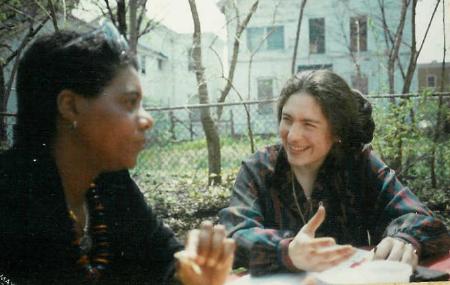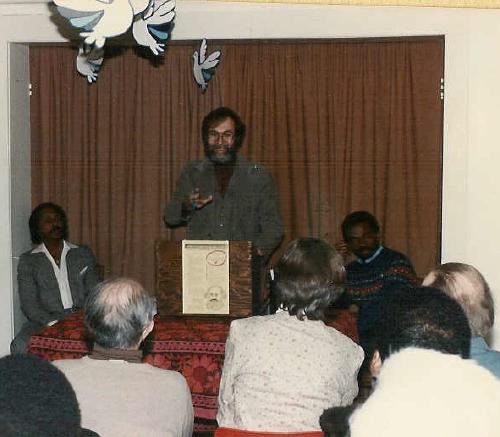Stories
Psychology for Revolutionaries
Psychology for Peace Activists
Why there are so few women warriors
The Seville Statement on Violence
A theory of mental illness
* * *
If by "communist" you mean dedication to radical change for social justice, then I guess I have always been a communist, beginning in childhood. If, on the other hand, you mean a member of the Communist Party of the USA, then we are talking about 1980-1991.
I had been impressed already in the Sixties by the communists I met. During the Sixties the Communist Party in Connecticut had been reduced by government repression to only two members (both named Sid). When I first met Nina she told me how the two Sids had tried to recruit her into the Communist Party following her participation in the Venceremos Brigade that went to Cuba. Burned by the fact that her father had lost his job through anti-communism in the 1950's, Nina refused their offer. During the late 1960's Sid Taylor came up to me once during an anti-war demonstration on the New Haven Green. There in the shadow of Yale's ivy-covered walls, he put his hand on my shoulder and counselled, "Patience and optimism." And as the Seventies began, I worked with Joelle Fishman on the Modern Times newspaper and was horrified when the New Left kicked her out of the paper she had founded because she announced she had joined the Communist Party. I was especially impressed by the patient, long-term perspective of Carl Winter, a veteran of the Communist movement of the 1930's who came to New Haven especially to meet with Joelle and a few other activists close to the Party as we felt AIM and the New Left collapsing under us.
Then beginning in 1974, I started traveling to the Soviet Union and working there and becoming familiar with and favorably impressed by Soviet socialism.
However, it wasn't until the fall of 1980, with the disintegration of my first marriage and my disillusionment with the misuse of science that I joined the party. Appropriately it occurred at Sid Taylor's modest house on Valley Street with Joelle present, since it was mostly through Joelle that I had come to have such a high opinion of the Communist Party, as she is one of the most heroic, yet modest people I have ever met. When I first met her prior to her founding of Modern Times, she was extraordinarily shy. Later when she entered politics as candidate for US Congress or New Haven mayor, she gained poise and confidence as a public figure. But the modesty remained forever, even as she became a remarkably effective organizer, dedicated to the communist principle of empowering the multi-racial working class.
During the 1980's, as a local club member I was involved in the union organizing of clerical workers at Yale and later for local organizing at Quinnipiac Terrace in Fair Haven where I lived. And I worked actively in electoral petitioning to put the Communist Party on the ballot (Joelle and I personally gathered thousands of signatures at flea markets), and on election campaigns in which Joelle ran for mayor and for Congress and a campaign for Pam Saffer for local office in Fair Haven. In 1980 I was initially the campaign manager for Joelle's mayoral campaign, replaced then by Warren Gould who later became President of the New Haven Labor Council and who is now our neighbor in Short Beach. Warren and I also worked together in a small organiation to reform state election laws, for which I invented the name: V.O.T.E.R., Voter Opportunity Through Electoral Reform. Those electoral and organizating activities kept me grounded in the day-to-day struggles of working people.
Lindsay shared my involvement with the Party, working in the Yale Club in conjunction with her union activism at Yale. At one point, in 1985 she went to Moscow along with fellow union activists in a voyage organized by Warren Gould. Also, at one point, she coordinated a visit to New Haven by the great South African communist, Chris Hani, who was later assassinated, and at one point we went down with a Party group to the great reception for Nelson and Winnie Mandela when he made his triumphant tour after leaving prison. Yankee Stadium was filled with activists and their banners, but we could see from the look on her face that Winnie Mandela was not happy and that their marriage was breaking up. We were especially fond of a Black couple who worked with the party, Craig Gauthier who had been President of the Machinists Union at the Winchester gun company, the largest manufacturing plant in New Haven, and his wife (at that time), Pat Scales. Along with Joelle, they both took part in our wedding ceremony.
At a state-wide level I worked with a state peace commission of the Party and organized a group of labor for peace which worked on economic conversion and ran a Peoples School for Marxist Studies. In 1988 and 1989 we issued a very nice pamphlet called The Statre of Peace and Solidarity Movements; The perspective of the Peace and Solidarity Commission of the Communist Party of Connecticut and mailed it out to about 300 people including leading elected officials. There is a nice letter of response from Congressman Bruce Morrison dated February 27, 1988.
And on a national level, along with Pamela Saffer from Connecticut, I worked with a National Peace and Solidarity Commission from January 1989 until September 1991, where I took responsibility for American-Soviet Friendship. The Commission was chaired at that time by the strong and militant Black activist, Charlene Mitchell, who later split from the Party along with Angela Davis, Barry Cohen, Mark Solomon and others, to form the "Committees of Correspondence for Democracy and Socialism." Looking back over a full set of minutes from their monthly meetings, I am struck by a lack of effectiveness of our work. I wrote editorials on peace occasionally for the weekly Party newspaper, including a set of editorials which I constructed in a 14 paragraph form based on the dynamics of a sonnet. I also wrote a couple of articles for their magazine, Political Affairs, one on sociobiology under the name Mathews, and another under my own name to analyze economic factors of the arms race in the fall of the Soviet Union. Excerpts of the latter are available on the Internet at http://www.culture-of-peace.info/soviet-collapse/introduction.html . Not surprisingly, I ran into conflicts with the bureaucracy of the Party, to the point that at one of the national conventions during the 80's,, James Jackson who at that time was responsible for peace and solidarity at the national level, denounced what he called "pests for peace" who insisted on the importance of this topic. I told Joelle that I would come to the next convention with a special pin called "pest for peace." She didn't laugh.
One year (1990), during a sabbatical from Wesleyan, I worked with Lee Dlugin of the International Department in a small paper-cluttered office on West 23rd Street. Lee had been a roommate of my first wife Nina when they were in college. At one time when Nina and I were in New York, we had run into Lee and her newly-wed husband, also from the Party, and as it turned out to be their wedding day, we took them out to dinner to celebrate. My task in 1990? - ghost writer of international correspondence on behalf of the Party. At that time I still hoped for the development of the global communist movement.
Like so many communists, I was deeply wounded by the collapse of the Soviet Union and the socialist governments of Eastern Europe. But I was better prepared for this than most because of my years in the Soviet Union. In fact I remember perhaps the only time I ever went to a Central Committee meeting of the CPUSA. It somewhere near the end (probably in 1990). I tried to speak about the problems of the Soviet Union, but no one would listen. As I looked around the table at perhaps 20 people I realized that I was the only one that spoke good Russian or who had actually lived and worked in the Soviet Union. It wasn't even just an ideological issue. Not only had they invested their lives in believing that the Soviet Union would show the way to communism, but also the major income of the Party came from money sent by the Soviet Union to pay for bundles of the Peoples Weekly World newspaper. They just couldn't face the possibility that it was collapsing. Around this time I had a lunch with Victor Perlo, the veteran economist of the Party, and discussed with him my findings about the impending collapse of the Soviet Economy (eventually published in Political Affairs - see internet reference above). I got the feeling that he could not really understand what I was talking about!
The last convention I attended was that of December 1991 in Cleveland. Following the crash of the Soviet Union, many loyal communists rebelled against the old-fashioned leadership of Gus Hall at the same time as the FBI apparently gave orders to its many agents in the Party to wreak havoc and split. Hence, the convention was split. My own loyalties, weakened as they were by events, remained with the old guard but I remained on good terms with those splitting. One good friend, Barry Cohen (see photo with Marvel Cooke), who was editor of the Party newspaper, even asked me to mediate at a certain point, but it was too late. The convention was chaotic, and the Party lost many, perhaps half of its members.
Joelle Fishman did not falter but kept on organizing in New Haven and on a national level in charge of the Party's political work. I remained in touch with the Party during my years in France where the French Party helped me enormously to get oriented and to start work when I went to live in Paris. I kept in touch with the Party after my return from UNESCO to the States, but I did not rejoin. When I moved into New Haven I joined the city Peace Commission and worked with Joelle on that level since she was its most active member.

Joelle Fishman (on the right)

presiding over a session of the Peoples School
 |
Stages
1986-1992
Fall of the Soviet Empire
1992-1997
UNESCO Culture of Peace Programme